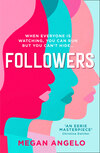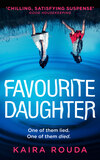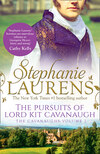Читать книгу: «Followers», страница 2
“Tomorrow?” Orla rolled her eyes sideways, grasping for an excuse.
“I just thought you might have some extra time,” Ingrid said meaningfully, “now that the Sage stuff is going away.”
Orla nodded. She would do it. The year before, a handsome European prince who was constantly falling down outside clubs got sober, joined the armed forces, and largely disappeared. As a result, one Lady-ish blogger lost her job. Orla was determined not to lose hers—after all, if she lost it, she would never get to leave it. And this was something she fantasized about constantly: her quitting Lady-ish after selling her book, just like her Tinder-star colleague. In the fantasy, she carried a box of her things, though she didn’t have things at the office. Her desk was just a two-foot section of a long cafeteria-style table shared by nine other bloggers. No one had drawers or plants or picture frames—they barely had supplies. “Where’s the pen?” one of them would cry out a few times a day, and whoever had it last would send it skidding down the row.
She knew she wasn’t the only one who dreamed about quitting. When she and her colleagues sat in the conference room, watching Ingrid run her laser pointer over a screen filled with top-performing headlines (“You Won’t BELIEVE What This Megastar Looks Like WITHOUT Her Extensions”), Orla would think about how every one of their minds was somewhere else, lusting over their next moves, reminding themselves they were better. Better than this job, and better than the girl in the next seat doing it, too. That last part was important. Orla believed it fiercely: she would be gone someday, on to greater things, and the next girl down would still be in her chair. She better still be in her chair. Someone had to stay to be who Orla was before.
But before what? That was the question in her mind at dawn, when Florence slammed over the threshold and woke her, and at night, when she lay staring at her phone while she should have been writing or sleeping. More than anything else—to be an author, to have a boyfriend, to learn how it felt to breathe without being forty thousand dollars in debt—she wanted the answer to the question. She was living in the before of something, and she was getting tired of it. The dangerous thing about the way she felt, Orla knew, was that she didn’t know exactly what she wanted to happen, and she didn’t care that she didn’t know. Almost any change would do.
CHAPTER TWO
Marlow
Constellation, California2051
The morning was for numbers. Marlow woke at seven to take one pill in front of—she gave a mental glance at the dashboard that kept track of her followers, blinking on the screen inside her mind—eleven-point-six million people, as of this moment. She hooked the quilt beneath her armpits in two places—wardrobe malfunction prevention had installed loops on all her bedding, had sewn prongs into the lace edges of the short silk gowns she wore to bed. Then she sat up and took three deep breaths, opening her eyes on the last one. She blinked four times, unhurried. Smiled twice. The first smile was meant to look sleepy, to hint at consciousness emerging. The second was meant to look spontaneous, giddy, as if she had just remembered that she was alive and felt unspeakably blessed.
To look, in other words, as though the pill worked that fast.
Lately, Marlow had been adding some movement to this second smile, sighing and stretching her arms over her head. But the network had sent her a clucking note yesterday, reminding her to aim for consistency wherever possible. Departures from long-held routines can seem to the audience like signs of emotional trouble. Her followers had other concerns. After Marlow lowered her palms this morning, she closed her eyes just in time to see a comment scrolling: Is it me or does Mar have kinda chubby armpits?
Marlow looked at Ellis, sleeping stomach-down beside her. She couldn’t ask him if he thought her armpits were fat. To bring it up on camera would be to acknowledge the follower’s comment, to acknowledge the existence of followers at all. This was against employee policy. Which was a total farce, of course; her followers knew she knew they were watching. They knew she could see them talking about her. But the fact that she and the other talent never let on, that they pretended to just be living—this was what her followers wanted. They liked to feel like voyeurs; they didn’t want to be looked in the eye. And so, as her contract stated: The Constellation Network has a zero-tolerance policy on spell-breaking.
She got up and padded across the bedroom, listening to the faint saw of the cameras in the shiplap wall’s grooves sliding on their tracks to follow her.
The writers had been editing her closet again, Marlow saw when she pulled its doors open. Yesterday, as the day stretched empty before her, Marlow had reclined in her backyard cabana, let her eyelids close behind her sunglasses, and intuited lazily, just for something to do: vintage fashion images. The browsing turned into obsession; the obsession turned into a wardrobe request that was filled within the hour. As Marlow sat cross-legged in her sarong on the dove-gray cushion, eating a spinach salad with strawberries, a drone descended from the sky and landed on the deck. It unfurled its arms to release a metal bar hung with the clothes she had asked for: jeans with the knees cat-clawed out, shoulderless blouses that billowed in the breeze as they settled down in front of her.
When she put everything on, Marlow grinned at herself in the mirror, feeling like a twenty-teens pinup. But then she saw her dashboard throbbing with feedback. Those pants just made me second-guess being on the same meds as her, someone wrote.
That night, as she lay in bed, Marlow heard the overnight drone making more noise than usual. After it cleaned and filed the dishes, after it folded the blankets she and Ellis left slopped on the couches when they ambled to bed, she heard the drone pushing its way into her closet, clattering around. Sure enough, this morning, all her vintage looks were gone.
Now she pulled a lime-colored hoodie and matching leggings off a hanger. If the network cared so much about what she wore, let them green-screen it in themselves.
Such a bold floral on that cardigan, but she’s pulling it off! went the follower comment that appeared a moment later. Clicking to buy!
Marlow fought the gag that rose inside her at the phrase bold floral. She swore someone in wardrobe had it out for her.
On the other hand, she thought as she went into the kitchen and opened the fridge, she had a guardian angel in craft services. Science had definitively linked caffeine to anxiety recently, and the network had immediately freaked about the optics of Marlow consuming it. But someone in crafty had come to the rescue, developing a coffee, just for her, that could be dyed to look like cold-pressed juice. Now Marlow uncapped a plastic bottle with a label that read Carrot Apple, took a sip of terra-cotta-colored liquid, and tasted the bitter cool of iced espresso. The sensation loosened her instantly; her shoulders retreated downward, her heart rose, her face relaxed. She could sense herself having an attractive moment, and, as if on cue, she heard a muted snap. The camera in the brass knob on the cabinet door across from her had detected, and captured, a still image perfect for the Hysteryl ad that would be patched onto the corner of her live feed in—Marlow counted—three, two—
She DOES always look so content though, someone piped up on her dashboard. Next time they do a promo code for Hysteryl I might give it a shot.
Doesn’t anyone think it’s weird the way she drinks that juice, someone else said. She’s like SAVORING the tiniest sips. I bet she’s on coffee and they’re CGI’ing shit.
Marlow froze with her lips on the bottle. She waited a beat for the comment to clear, then tipped her head back and forced herself to take a giant gulp of her drink. She exhaled discreetly, to keep from releasing the telltale coffee char of her breath. Then she stifled a smile; her followers couldn’t smell her. Her heartbeat stuttered as it always did when she came up with another thing, though sometimes she could go years on end without adding to the list: Things I Have to Myself. The hour before 3:00 and 4:00 a.m., when the network broke for ad interruption. Dressing rooms and doctor’s office chambers and bathrooms, in her home and all over town. Her favorite was a toilet stall in the vegan gastropub downtown—as a teenager, she used a nail file to scratch mean things about some of her ruder followers into its enamel walls. And now: her smell. Something small, but hers alone.

This was how it had gone, at Jacqueline’s parties, for nearly a decade: Marlow sat on the cantaloupe-colored sofa, against its right arm, her good side facing camera east. Ida slumped opposite her, on the daisy-patterned club chair, droning unbearably. Marlow had once liked being across from Ida, back when the woman was a bawdy, sloppy drunk. But these days, Ida was sober, and a stay-at-home mom, and she spent most of Jacqueline’s parties performing small dramas about her allergies. Marlow had seen Ida walk around an ottoman like it was a land mine, sniffling, “Oh, God, is that mohair?” Ida routinely flung herself across the room to close a window, whining, “Sorry, pollen, I have to.” Once, failing to detect Ida’s allergy profile from her device, a server bot had extended a tray of shrimp cocktail her way. Ida had gone to City Hall the next week, made a twenty-minute speech about her hives, and insisted that the network decommission—and dismember, Marlow recalled, with a scandalized chill—the offending machine.
But tonight, Ida was missing, recast without explanation. A new girl—olive-skinned and sleek, formidably cheekboned, with bronze lipstick and black hair parted into pigtail braids—sat in Ida’s chair with her bare feet pulled up under her, like she had been here forever.
Marlow looked at Jacqueline, who stood in the center of the thick sand-colored carpet, holding up something called a “scrunchie.” At these parties, Jacqueline pushed things that, according to her invites, changed her life: ab gadgets, smoothies, ugly quilted handbags. Marlow knew—they all knew—that none of these things had really changed Jacqueline’s life. The network chose the items based on sponsorship agreements. Then Jacqueline threw parties where she raised them up and gushed about them to her dozen in-person guests and her roughly nine-point-nine million followers—plus all of her guests’ followers, too. The items the network chose reflected Jacqueline’s core audience demo: married mothers across America, aged twenty-eight to forty-four, who tuned in while folding laundry around 9:00 p.m. on weeknights. Though Jacqueline fit squarely in with her followers—she was thirty-eight, with two daughters—she was always embarrassed when someone mentioned her demo. “It makes me feel so old and boring,” she told Marlow once. “It’s better than mine,” Marlow had said. No one would argue with that.
“Where’s Ida?” Marlow called to Jacqueline, raising her voice above the scrunchie-induced oohs and aahs.
Jacqueline ignored her. She pushed the scrunchie onto her wrist and waved her hand around for all to see. “And it’s supercute as a bracelet,” she said.
“Jac?” Marlow repeated. “Is Ida on vacation?”
The end of her sentence slipped under the clatter of something breaking on the ground. The women turned to see a server bot bent over the shards of a wineglass. Marlow watched the lilies in the coffee table vase twist in the same direction, their scarlet pistils stretching to train their tiny cameras on the action. She could swear the bot had dropped the glass to drown out the sound of Ida’s name.
When she looked back at Jacqueline, her friend nodded once and dabbed at her lips. It was their signal for Tell you off-camera.
An hour later, as Marlow passed the powder room, Jacqueline’s arm shot out of it and pulled her inside. “Ida’s gone,” she said, as she pulled the door shut.
“Gone?” Marlow saw herself in the mirror. One of Jacqueline’s hair drones, its silver talons clacking near her ear, had pinned a ridiculous silk bow barrette into her dark waves.
“Yup,” Jacqueline said. “Just up and left Mike and the kids. Blew right through the perimeter. Left the fucking state.” She walked her fingers on an invisible path through the air. “Check your map. She’s in Denver. And for God’s sake, Marlow—don’t mention her on camera again.”
“But what about her contract?” Marlow said. “I thought she and Mike were doing the whole on-the-rocks thing this year.” She unlatched her barrette and massaged her scalp, ignoring Jacqueline’s puffed breath of protest.
“They didn’t even stage a hunt for her, supposedly,” Jacqueline said, adjusting the pearl comb at her temple. She sucked her cheeks in and glared at herself in the glass. “How shitty would that feel? It’s like they don’t even care she’s gone. I honestly think the network was glad to get the chance to sub in that new girl. Diversity and all.”
“Jacqueline.” Marlow spoke in a firm voice. This was something she had been trying to do more since she turned thirty-five—the age felt, to her, like a cosmic deadline for being strong and self-possessed. Complete. “Hunts aren’t real,” she said.
“They certainly are,” Jacqueline returned, in a tone that trumped hers effortlessly, and Marlow let it go. Jacqueline was an incorrigible know-it-all. It was what Marlow loved most about her. Her friend’s brazen authority always made her feel safe.
Jacqueline’s eyes flitted away for a moment. She nodded, but not at Marlow. Her device was telling her something. “Gotta get back out there,” she said. “Talk later.”
Alone in the bathroom, Marlow twiddled the twigs in the diffuser on the sink and closed her eyes. Find Ida Stanley, she intuited.
In her mind’s eye, California shrank and plummeted away, making Marlow’s stomach flip, like she was the falling thing. Her map shifted, streaking past hundreds of her neighbors’ symbols in a blur, and brought her down again in Denver. Ida’s symbol—the red stiletto that had always depressed Marlow—hovered over the city. There she was, proudly gone, in the state of—Marlow had to zoom out to remind herself what state Denver was in—Colorado. Marlow pictured Ida on a purple-flowered mountain. Sneezing.
The black gem at her wrist nicked her gently. I have a message from production, came the voice in her brain. I should return to an on-camera space. I have now been off camera five minutes. I have lost seventy-eight followers during this off-camera time.
Marlow watched herself blush with guilt in the mirror. It was as if the network knew what she was thinking about just then: what it would be like for her to leave, too.
I have lost eighty-nine followers during this off-camera time, the voice followed up.
Eighty-nine followers was nothing. Marlow averaged an audience of over twelve million. And that was why Ida could run, she thought, and get away with it, whereas she wouldn’t. Ida had, what—one, one-point-five million followers? Hardly a fan favorite, especially after she transitioned from the party-girl ensemble to a standard housewife arc. She didn’t even have a sponsor. Marlow, by contrast, was the most looked-at woman in the room, presented by a marquee partner: Hysteryl. Her followers—the people who observed every move she made—were spread across the rest of America and various races and age groups. What they had in common was that they were troubled. This was how the network marketed her: as the poster child for troubled, the Constellation star who got what they were going through. The network mined public data, looking for adults whose devices clocked too much crying or eating, for kids whose heartbeats surged to panicked levels during gym class. Meet Marlow, went the ad the network would beam straight to their devices. She knows just how you feel. The sad people, glad to be talked to, would opt right in and start watching her. They would see that she moved through her days with buoyant normalcy, and they would be reminded, every so often, that Hysteryl had made her this way. It was Jacqueline’s job to show America what they could buy to keep them happy. It was Marlow’s job to show them what to swallow.
She calmed herself at the sink, willed the redness to fade from her cheeks.
I should return to an on-camera space.
Marlow’s hair was bent and snarled where she had pulled out the bow. She dug the clasp back in, even tighter this time, and went back out to the party.
CHAPTER THREE
Orla
New York, New York2015
The red carpet Ingrid sent Orla to was at a terrible club on a terrible block. Bits of trash stuck to the filthy red carpet slapped down at its entrance. A bouncer stood at the doorway, staring straight ahead, as if trying to block out the Container Store directly to his right.
Orla scanned the ground and found her place, a square of sidewalk the size of a cereal box, marked with a laminated printout: ORLA CADDEN, LADY-ISH.COM. She elbowed her way in next to an anxious waif who wore a gown that plunged to her belly button. She was dressed, Orla knew, like she was hoping to be invited inside later. A chubby Hispanic guy in horn-rimmed glasses held his phone up to the waif, filming her as she said: “We’re here at the launch of Hilaria Dahl’s dog sweater line, and all the hottest celebrity animal lovers have tuned out for the occasion.”
“Turned out!” Horn-rimmed Glasses shrieked as if he had just caught fire.
Hilaria Dahl was a judge on a reality show that pitted cancer survivors against each other in baking contests. By the time she made her way to Orla, Hilaria had submitted to eighteen other interviews, and the corners of her mouth were caked with spit. She smacked her lips together. “I love Lady-ish!” she squealed, her long earrings jangling at either side of her jaw.
Orla nodded and stretched her face into a smile. “So, dog clothes! What inspired this project?”
Hilaria shifted in her heels. “Well, it’s really close to my heart.”
“What is?” Orla said.
“AIDS,” Hilaria answered.
“AIDS?” Orla looked to Hilaria’s publicist, a black-clad woman in a headset.
“Ten percent of the proceeds from the line benefits AIDS,” the publicist snapped.
“And I love animals,” Hilaria added. “I loved the idea of putting my name on something that would keep them warm, the way they keep us warm.”
Next to Orla, the waif was nodding fiercely, a hand pressed over her heart.
“We’re just targeting dogs right now,” Hilaria went on. “But I’m also really passionate about cats. So we’re looking to expand into the cat market as well.”
Orla couldn’t stop herself. “Couldn’t cats just wear the clothes you make now?”
Hilaria looked at her publicist. “I guess cats could wear the small ones, right?” she said uncertainly. “Like the alpaca cowl-neck?”
“Cats could wear the small ones,” the publicist confirmed, glaring.
“And every piece is one hundred percent vegan!” Hilaria shouted.
“Didn’t you just say something’s alpaca?” Orla said. “An alpaca is an animal. It’s kind of like a llama.”
“That’s all the time she has,” the publicist said, taking Hilaria by the elbow and guiding her toward the doors. She looked back at Orla. “Fuck you,” she said plainly. “Not you,” she added, into the headset. “But maybe you, soon, if you don’t find out where Isabelle went.”
There was a lull in the arrivals. The waif was complaining to Horn-rimmed Glasses, claiming her improv teacher had called her too pretty for comedy, when Horn-rimmed Glasses waved his hand in her face and bellowed, “GIRL SHUT THE FUCK UP HERE SHE COMES.”
Orla perked up and craned her neck toward the SUV that had just pulled up. Hilaria’s publicist had likely emailed Ingrid already, demanding that Orla apologize. Maybe Orla could redeem herself with a quote from whoever was making Horn-rimmed Glasses clap tiny, overjoyed claps.
Flashbulbs popped so brightly that Orla had to look down. Then she could only see the pair of legs coming toward them, oiled and deliberate. Next to her, the waif leaned forward and said breathlessly, “Floss, it’s like the hugest honor.”
Standing in front of the waif, Orla saw as bursts of light cleared her vision, was her own roommate. Florence.
Orla stared at her from the side. She was closer to Florence now than she had ever been in their apartment. The skin that ran from her ear to the corner of her mouth shimmered with such pearlescence that Orla could see her own shadow in it. Florence’s eyes, dark and liquid, blinked slowly, sleepily, beneath the weight of her thousand-legger eyelashes. She had more hair than she did at home, and they were laughably bad, the extensions—limp, and shiny, and stinking of something chemical. Florence had on the same things Orla wore on formal occasions: a strapless, nude bra and stomach-slimming nude panties that continued down the thigh. But Florence wasn’t wearing anything over them.
She was beautiful, the type of beautiful that made Orla wish that she knew more of Florence’s bad qualities, so she could soothe herself by listing them out loud.
Then, suddenly, Florence was air-kissing the waif goodbye and stepping into Orla’s little space. “Hi,” Florence trilled. Orla startled at the sound of her public voice. It came from somewhere high in her nose. “Oh,” Florence went on, “I love Lady-ish.”
“Florence,” Orla said.
“Call me Floss!” Florence giggled. She pulled all of her hair over one shoulder and stroked it like a pet.
They were at an impasse: Floss didn’t recognize Orla, and Orla didn’t know who Floss was supposed to be. As Orla tried to decide what to say next, Floss’s publicist—she had a publicist!—jumped in.
“Jordie from Liberty PR,” he said. “You of course know Floss Natuzzi from the reality competition Who Wants to Work at a Surf Shack.” His voice had a defeated sort of hum, like he no longer got up in the morning hoping people would take him seriously. Orla could envision the half-finished law school application on his desk at home. “She’s also a fixture on the Akron fashion scene,” Jordie added, “where until recently she lived with Columbus Blue Jackets star Wynn Walters.”
“The Athens fashion scene?” Orla said.
“Sure, let’s go with that,” Jordie sighed, at the same time Floss said loudly, “No, Akron. Akron, Ohio.”
Jordie shot Floss a look, then laughed and threw his hands up. “Yes, Akron,” he said wearily. “It’s mostly, ah, underground. Very avant-garde. LeBron James...” He trailed off purposefully. It wasn’t a lie; he had merely said the words “LeBron James.” Orla nodded appreciatively. He would do well at law school.
She looked at Floss, who seemed not to be listening. She was peering down at the printout Orla was standing on, then back up at Orla’s face. As Jordie tugged her toward the next reporter, Floss seemed to realize something. “Wait,” she said, blinking, looking back. “Omigod.”
Orla waved at her stupidly.
“Come inside, then,” Floss called over her shoulder. “I want to talk to you.” She tottered off on her heels. Orla watched as Jordie stepped forward to pull something off Floss’s wrist. It was Orla’s own yellow hair elastic. She had left it on the sink that morning.
“What, you know her?” Orla heard the waif say, sullenly. Out of some instinct, Orla didn’t respond. Floss was only the last to arrive at a party for dog shirts in Midtown, but she was clearly someone to someone, and she had told Orla to come inside. Orla didn’t have to talk to the waif anymore.

The girl at the door with the list was unimpressed. “I’m a personal guest of Floss Natuzzi’s,” Orla said again. “She’ll be so upset to hear about this.” The girl just looked behind her, waving someone forward. Orla stepped back to let an Afghan hound in a beret and its handler walk through.
She walked along Fifty-Seventh Street and found she could see into the event, which spilled into a courtyard fenced in by wrought iron. Floss was just a few yards away, talking to a short, sweaty man with his shirt buttons mostly undone.
Orla put her face to the bars and hissed into the party. “Floss!”
Floss looked up. She turned away from the man while he was still midsentence and came trotting over to Orla. “What are you doing? I said to come inside.”
“They wouldn’t let me,” Orla said. “Can you get me in?”
Floss looked down at Orla’s scuffed ballet flats and murmured, “Those, probably.” She took a glass of champagne from a waitress and slid it through a gap in the fence to Orla.
“You can’t—” the waitress began, and Floss fixed her with a cold smile. “Did they resolve the oyster situation yet?” she asked the waitress. “Would you please find Gus and find out? I’ll wait here.” The waitress scurried away.
“Who’s Gus?” The champagne glass felt so delicate in Orla’s grasp, she had to focus on not crushing it.
Floss rolled her eyes. “There’s no Gus.” She drained her champagne and motioned for Orla to drink hers down. “Wait there,” she said.
Three minutes later, Floss was walking toward Orla, one arm in the air, hailing a cab. When one stopped, she stood there blinking at it until Orla stepped forward and opened the door, then stepped back to let her in first.
Jordie skidded out of the club toward their cab, the soles of his needle-nosed shoes slipping on the pavement. He stuck his head through the window. “Where the hell are you going?” he said to Floss. “Do you know how I had to beg to get you into this party? You’re nobody, honey.” A drop of sweat eased out of a crease in his forehead and landed on Floss’s thigh, right where the nude shorts disappeared into the boot that stretched over her knee.
Floss dabbed at the mark. “If you had to beg that hard,” she said calmly, “I guess you’re nobody, too.”
The light turned green. As the cab pulled away, Orla glanced over her shoulder at Jordie. She thought he’d be staring after them, reeling from the exchange, but he was already back on his phone, skating toward the party.
Perhaps it was because Orla remembered how he looked from that distance—freckles you could sense a block away—that she recognized Jordie’s photo on the cover of the New York Post, more than a year later, while she was still walking toward it. She would never forget him. Nobody would. Jordie was the very first to die in the Spill. The story about his death didn’t mention his working with Floss, which surprised Orla at first. By then, even a minor interaction with Floss would be the starriest thing that had ever happened to most people, and any reporter with a brain and a LinkedIn log-in could have dug up Jordie’s connection. Then Orla remembered: the reporter who wrote about Jordie dying wouldn’t have been able to see his LinkedIn page—wouldn’t even have been able to google him. The reporter must have had to rely on word of mouth and yearbooks. Jordie’s aunt was quoted as saying that he had just been accepted to law school. When Orla read that—her snarky prediction in print—she let out an actual howl, and crushed the paper in her hand. The newsstand attendant, who had been staring at the white grid on his useless, frozen phone screen, startled. “One dollar, you know?” he said to Orla. But he sounded scared, like he was only suggesting it. Orla dropped the paper and kept walking, kept crying. This was back when things had gotten as bad as everyone thought they would get, and when no one knew yet how bad things would actually go on to be. There were still jokes about the chaos on the late-night shows. There were still late-night shows.

When Orla and Floss got back to Twenty-First Street, the doorman grinned at them in a way that let Orla know they looked drunk, and the smile she gave back to him made her feel like she was someone else, someone used to being part of things. In the elevator, Orla reached for 6, but Floss batted her hand back and sent them to the roof. Orla hadn’t been up on the roof since a few weeks after she moved to the city. She had gone up there one night with a book and a glass of warm white wine, because she was twenty-two and didn’t know to chill it yet. The roof was a disappointment. There was nothing to see from the one bench rooted next to the cluster of air handlers. A neighboring, newer building stood in the way of the view. Orla had spent fifteen minutes rereading the same page before she gave up and went in, imagining the people whose windows faced the courtyard laughing at her over their dinners.
The one corner that escaped the adjacent building’s shadow was reserved for residents of the penthouse. But Floss walked straight toward the gate to the penthouse’s private patio and rattled it open. She stepped inside without looking back to see if Orla was following. She was.
The patio had a modest outdoor dining table and a row of hostas in wooden planters. Floss kicked at a red-and-yellow toddler car in her path, then reached into one of the planters and pulled out a bottle of whiskey. Above the top of the patio fence, the view stretched, uninterrupted, toward New Jersey. The sun was already gone, dragging the last of its light down over the Hudson. Orla sensed another glow behind her and turned to see, beyond a pair of sliding glass doors, a giant television flashing out the news. Opposite it, a man leaned back on his couch. His feet, in black socks, rested on the coffee table. Without smiling, he raised his glass to Orla.
Начислим
+24
Покупайте книги и получайте бонусы в Литрес, Читай-городе и Буквоеде.
Участвовать в бонусной программе

















